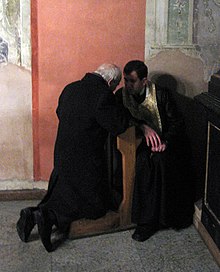ಹಾಂವ್ ಪಾತ್ಕಿ, ಮಾಗ್ಣೆಂ
| |
|
ಕನ್ನಡ್
|



I Confess
बदलಹಾಂವ್ ಪಾತ್ಕಿ,
ಸರ್ವ್-ಪದ್ವೆದಾರ್ ದೆವಾಕ್,
ಆನಿ ತುಮ್ಕಾಂ ಭಾವಾಂ-ಭಯ್ಣೀಂನೊ,
ಮ್ಹಜೊ ಗುನ್ಯಾಂವ್ ಉಚಾರುನ್ ಸಾಂಗ್ತಾಂ,
ಮನಾನ್ ಚಿಂತುನ್ ಆನಿ ತೊಂಡಾನ್ ಉಚಾರುನ್,
ವಾಯ್ಟ್ ಆಧಾರುನ್ ಆನಿ ಬರೆಂ ಸೊಡುನ್,
ಹಾಂವೆಂ ಜಾಯ್ತಿಂ ಪಾತ್ಕಾಂ ಕೆಲ್ಯಾಂತ್.
(ಹರ್ದ್ಯಾಕ್ ಮಾರುನ್) ಹೊ ಮ್ಹಜೊ ಅಪ್ರಾಧ್,
ಹೊ ಮ್ಹಜೊ ಅಪ್ರಾಧ್, ಹೊ ಮ್ಹಜೊ ಭವ್ ವ್ಹಡ್ ಅಪ್ರಾಧ್.
ಹ್ಯಾ ಪಾಸ್ತ್ ಭಾಗೆವಂತ್ ಸದಾಂಚ್-ಆಂವ್ಕವಾರ್ ಮೊರ್ಯೆಕ್,
ಸಗ್ಳ್ಯಾಂ ದೇವ್-ದುತಾಂಕ್ ಆನಿ ಭಕ್ತಾಂಕ್, ಆನಿ ತುಮ್ಕಾಂ ಭಾವಾಂ-ಭಯ್ಣೀಂನೊ,
ಮ್ಹಜೆ ಖಾತಿರ್ ಆಮ್ಚ್ಯಾ ಸರ್ವೆಸ್ಪರಾ ದೆವಾ ಲಾಗಿಂ, ವಿಂತಿ ಕರಾತ್ ಮ್ಹಣ್, ಪ್ರಾರ್ಥುನ್ ಮಾಗ್ತಾಂ.
ಆಮೆನ್
Confiteor
बदलThe Confiteor (so named from its first word, or incipit, in Latin, meaning "I confess" or "I acknowledge") is one of the prayers that can be said during the Penitential Act at the beginning of Mass of the Roman Rite in the Catholic Church. It is also said in the Lutheran Church at the beginning of their Divine Service, and by some Anglo-catholic Anglicans before Mass. The prayer is started by the Priest and ended by the people. This prayer is referred to as the "absolution", a prayer for forgiveness, not a granting of forgiveness as in the Sacrament of Penance. It is therefore classified as a sacramental, not a sacrament.
Usage in Catholicism
बदलThe text of the Confiteor in the 1970 Missal is as follows
Text in Latin
- Confiteor Deo omnipotenti,
- et vobis fratres,
- quia peccavi nimis
- cogitatione, verbo,
- opere et omissione:
- mea culpa, mea culpa,
- mea maxima culpa.
- Ideo precor beatam Mariam semper Virginem,
- omnes Angelos et Sanctos,
- et vos, fratres,
- orare pro me ad Dominum Deum nostrum.
Official English translation
- I confess to almighty God
- and to you, my brothers and sisters,
- that I have greatly sinned,
- in my thoughts and in my words,
- in what I have done and in what I have failed to do,
- through my fault, through my fault,
- through my most grievous fault;
- therefore I ask blessed Mary ever-Virgin,
- all the Angels and Saints,
- and you, my brothers and sisters,
- to pray for me to the Lord our God.